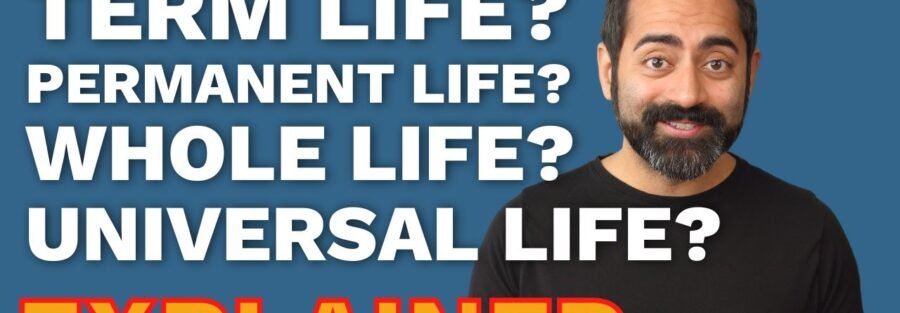I don’t sell life insurance, so this is just educational. This video explains life insurance from scratch and by the end you will …
[wpcode id=”4722″]
Life insurance is a crucial financial product that provides financial protection for your loved ones in case of your untimely death. In the event of your passing, a life insurance policy will pay out a sum of money to your beneficiaries, ensuring that they are taken care of financially during a difficult time. There are several types of life insurance policies available, each with their own unique features and benefits. In this article, we will explain the different types of life insurance policies – term life, whole life, universal life, and variable life – to help you make an informed decision about which policy is right for you.
Term Life Insurance:
Term life insurance is the most basic and affordable type of life insurance policy. It provides coverage for a specific period of time, typically ranging from 10 to 30 years. If the insured individual passes away during the term of the policy, a death benefit is paid out to the beneficiaries. However, if the insured individual outlives the term of the policy, no benefits are paid out.
Term life insurance is designed to provide coverage for a specific period of time when financial obligations are at their highest, such as when raising children or paying off a mortgage. It is a good option for those who want temporary coverage at an affordable price.
Whole Life Insurance:
Whole life insurance is a permanent life insurance policy that provides coverage for the entire lifetime of the insured individual. The policyholder pays premiums on a regular basis, and in return, a death benefit is paid out to the beneficiaries upon the insured individual’s death.
In addition to the death benefit, whole life insurance policies also have a cash value component that grows over time. This cash value can be accessed by the policyholder through loans or withdrawals for various financial needs. Whole life insurance is a good option for those who want lifelong coverage and the added benefit of a cash value component.
Universal Life Insurance:
Universal life insurance is a flexible type of permanent life insurance policy that allows the policyholder to adjust the death benefit and premiums as needed. The policyholder can also contribute additional funds to the policy, which can help to build cash value over time.
Universal life insurance offers the flexibility to change the coverage amount and premium payments to suit changing financial needs. It is a good option for those who want permanent coverage with the ability to customize the policy to their specific needs.
Variable Life Insurance:
Variable life insurance is a type of permanent life insurance policy that combines a death benefit with an investment component. The policyholder can choose from a variety of investment options, such as stocks, bonds, and mutual funds, to build cash value within the policy.
The cash value of a variable life insurance policy fluctuates based on the performance of the underlying investments. This means that there is potential for growth, but also the risk of loss. Variable life insurance is a good option for those who are comfortable with investment risk and want the potential for higher returns.
In conclusion, there are several types of life insurance policies available, each with their own unique features and benefits. Term life insurance provides coverage for a specific period of time, while whole life insurance offers lifelong coverage with a cash value component. Universal life insurance is a flexible policy that allows the policyholder to adjust coverage and premiums as needed, and variable life insurance combines a death benefit with an investment component. It is important to carefully consider your financial needs and goals when choosing a life insurance policy to ensure that you have the right coverage for your specific situation.











